Germany and Italy block Brussels from banning petrol and diesel cars
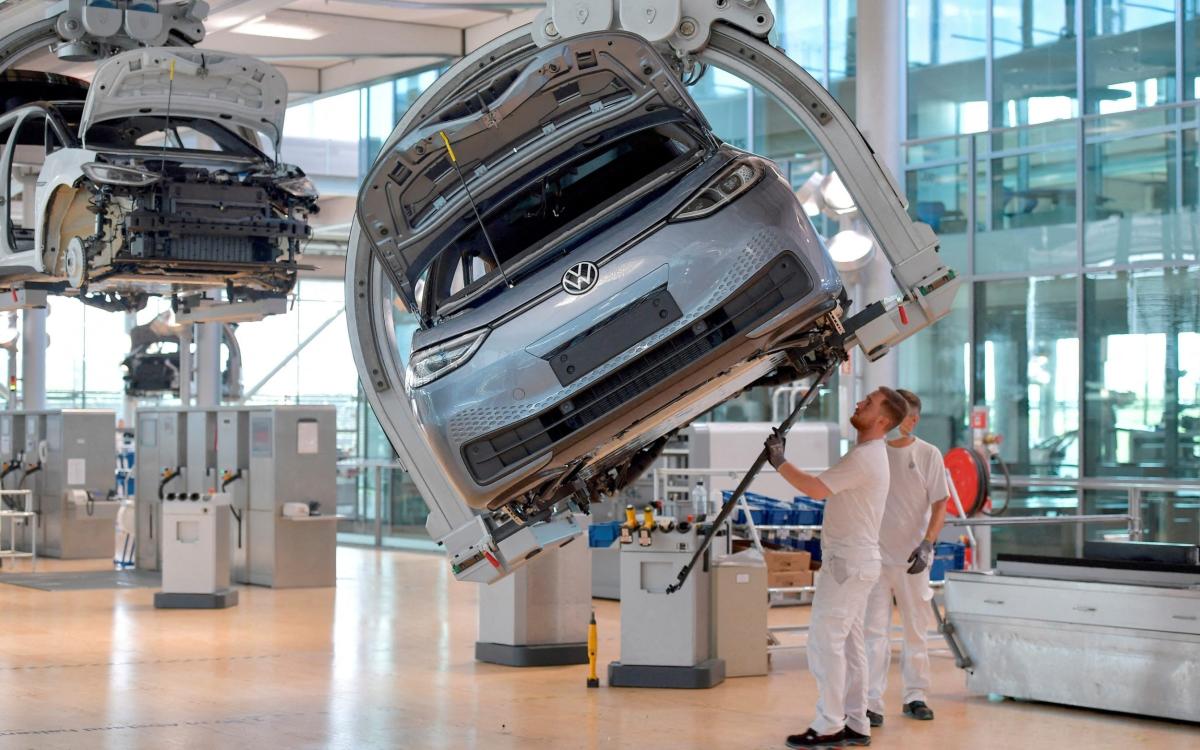

Germany and Italy have thrown a planned European Union ban on new petrol and diesel cars into disarray as they seek exemptions to protect their powerful car industries.
EU diplomats have been forced to delay a key vote on the proposals, which would outlaw the manufacture of combustion engine cars across the bloc from 2035, following a last-minute revolt by the two countries.
The plans were agreed in principle last year and would prevent the sale of new cars unless they are “zero emissions”. However, they still require final approval from member states.
Germany, along with allies, is seeking an exemption for cars running on so-called e-fuels, such as kerosene made from waste, which are being developed by some manufacturers.
It has forced EU officials to delay a vote that was due to happen on Tuesday.
The laws cannot pass without Berlin’s backing and have led to a split within Chancellor Olaf Scholz’s coalition government, with his FDP partners agitating for the EU’s plans to be loosened.
Volker Wissing, the FDP transport minister, said: “It is contradictory when the EU Commission calls for high climate protection targets on the one hand, but on the other hand makes it more difficult to achieve these targets through overambitious regulation.”
Ursula von der Leyen, the European Commission president, is now expected to meet Mr Scholz over the weekend as diplomats scramble to resolve the row.
Matteo Salvini, Italy’s deputy prime minister, cheered the delay and added: “The voice of millions of Italians has been heard.”
The last-minute hold-up is highly unusual, with the upcoming vote previously seen as a formality.
Special business correspondent Matt Oliver has more details here.
06:13 PM
Signing off
I’m off! Have a great weekend and see you first thing on Monday.
06:12 PM
Students could be allowed to use ChatGPT for GCSEs and A-levels
GCSE and A-Level students would be allowed to use ChatGPT in coursework under plans being discussed in Whitehall.
James Warrington has the story:
Test-setters are in talks with the Government to draw up guidelines for the use of artificial intelligence (AI) ahead of this summer’s assessments.
It comes amid fears that students could use popular new chatbots such as ChatGPT to write essays.
Pearson, the UK’s biggest qualifications group, is among organisations calling for clarity from ministers over Britain’s approach to the new technology.
Andy Bird, chief executive of Pearson, said: “We’re in close consultation with the Department for Education in terms of forming policy and I think you can expect word from the department in the future around creating standards around that.”
The Joint Council for Qualifications, which represents the UK’s eight biggest exam boards, is expected to set out a view on what should happen shortly. However, it will be up to regulator Ofqual to determine the rules.
05:47 PM
Royal shortbread maker planning vegan biscuits
The King’s shortbread maker is preparing to go vegan.
Senior business reporter Daniel Woolfson has the story:
Walker’s Shortbread, the 125 year-old Scottish biscuit maker and royal warrant holder, is exploring how to create a vegan version of its best-selling product in an effort to broaden its appeal.
Managing director Nicky Walker, who is a fourth-generation member of the business’ founding family, said: “Vegan is very much something we’re looking at right now.
“We like our product to be globally accepted, whether that means kosher, organic, gluten-free… we want to have our product enjoyed by as many different factions as possible.”
Founded in 1898 by Joseph Walker, Walker’s shortbread is one of Scotland’s best-known brands and is known for the red and black tartan on its packaging.
Walker’s was granted a royal warrant to supply the late Queen Elizabeth II with shortbread in 2017. Prior to that it held a warrant for the supply of oat cakes to the late Queen Mother and the royal household.
05:22 PM
Germany and Italy block Brussels from banning petrol and diesel cars
European Union diplomats have been forced to delay a key vote on plans to ban combustion engine cars across the bloc from 2035, after Germany and Italy mounted a last-minute revolt.
Matt Oliver explains:
The proposals, agreed in principle last year, would prevent the sale of new cars unless they are “zero emissions”.
But they still require final approval from member states and Germany, along with allies, is seeking an exemption for cars running on so-called e-fuels, which some manufacturers are developing.
It has forced EU officials to delay a vote that was due to happen on Tuesday.
05:19 PM
Shearman & Sterling and Hogan Lovells call off merger talks
Wall Street law firm Shearman & Sterling and London-headquarted rival Hogan Lovells have abandoned merger negotiations.
The combination, which could have created legal powerhouse boasting over $3bn (£2.5bn) in revenue, was not in their interests, the two firms said in a joint statement.
They said:
As has been widely reported, our firms have been in preliminary and exploratory conversations regarding a possible combination.
After careful consideration, we have mutually agreed that a combination at this time is not in the best interest of either firm. We have been deeply impressed with each other’s business, practices and people and wish each other continued success.
04:53 PM
FTSE 100 ends the week higher
The FTSE 100 dragged itself into the green this afternoon, closing 0.039pc higher at 7,947.11
The blue-chip index opened higher, boosted by mining stocks as metal prices rose on optimism of a recovery in top consumer China, while an overnight rise in US stocks also helped gains.
However, the energy heavy index sharply sank to an intraday low of 7,920.07 this afternoon, as reports of a feud between Saudi Arabia and the UAE saw oil prices plunge.
The FTSE 100 ends the week 0.87pc higher, reversing much of last week’s losses.
The domestically focused FTSE 250 finished 0.37pc higher at 19,925.77.
04:38 PM
Oil prices sharply recover
The price of Brent crude has made a sharp recovery, climbing to over $85 per barrel.
Oil prices have swung sharply today after suggestions that the UAE is debating whether to leave the Opec cartel of oil-producing countries.
Such a move would free up the country to lift production and flood the world with oil.
Brent crude fell as much as 2.8pc on the day to below $83 a barrel after a report in the Wall Street Journal that the UAE is considering quitting the alliance.
However, the price of Brent crude rallied soon after.
Set up in 1960, Opec is a cartel of 13 oil-rich countries which co-ordinates their production levels.
UAE has said it is sticking to the current Opec deal for at least this year.
It comes amid a growing rift between the leaders of UAE and Saufdio Arabia.
The relationship between Saudi Crown Prince Mohammed bin Salman and President Sheikh Mohammed bin Zayed al Nahyan has reportedly deteriorated.
The two men have drifted apart as they offer divergent visions of leadership, the Wall Street Journal reported.
04:17 PM
Lloyds Pharmacy could close all UK branches
Lloyds Pharmacy has reportedly put all of its 1,300 branches at risk of closure.
The chemist chain, owned by private equity company Aurelius Group, has launched a strategic review of its entire UK operations, The Sun reported. This could result in all pharmacies being sold or closed.
It comes after Lloyds Pharmacy, which employees 17,000 people, announced that 237 branches within Sainsbury’s supermarkets will close by end of the year.
03:55 PM
China’s reopening boosts Tesla sales
Tesla’s sales in China rebounded last month as consumer spending recovers from the country’s zero-Covid policy.
Shipments from Tesla’s Shanghai factory were up 13pc from January at 74,402 vehicles, according to new data from China’s Passenger Car Association.
It’s a 32pc year-on-year increase, although still lower than the record 100,291 vehicles reached last November.
Despite slashing the price of its electric vehicles, Tesla faces stiff competition in China from rival BYD Auto. The Chinese-owed manufacturer, which offers fully electric and plug-in hybrid models, more than doubled shipments last month to 193,655 vehicles.
Tesla shares have risen 3.02pc today.
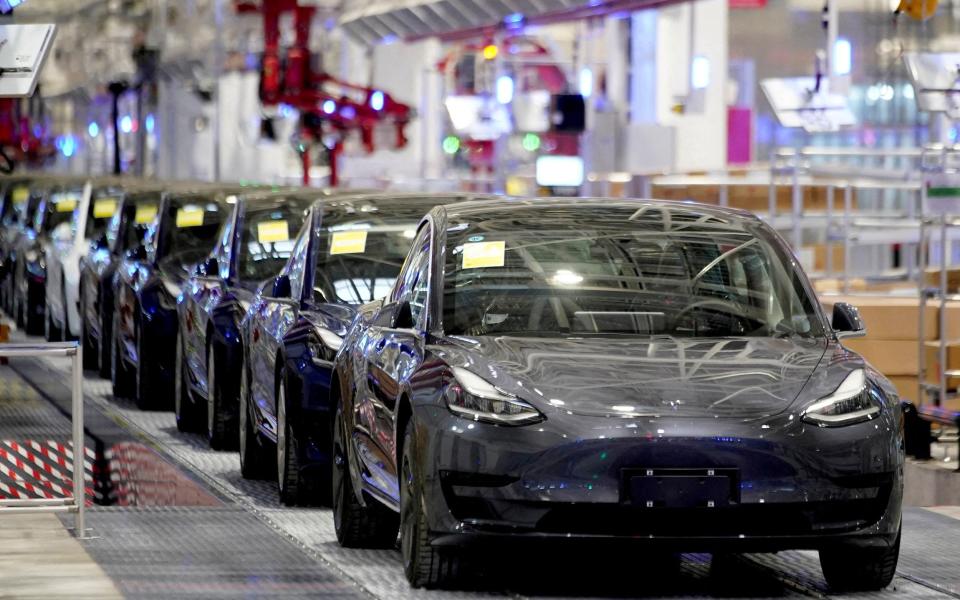
03:32 PM
Handing over
That’s all from me for this week. As ever, Adam Mawardi will take things from here and guide you into the weekend.
03:29 PM
Amazon pauses construction on second headquarters
Amazon is pausing construction on its sprawling second headquarters near Washington amid the company’s deepest ever job cuts.
John Schoettler, Amazon’s real estate chief, confirmed the pause in a statement to Bloomberg News.
Mr Schoettler said the company remains committed to Arlington, Virginia, where by 2030 Amazon has committed to spend $2.5bn (£2.1bn) and hire some 25,000 workers.
But the construction moratorium will delay the online retailer’s full arrival at its biggest real estate project.
It could create headaches for local developers, as well as construction and service workers banking on Amazon’s rapid expansion.
The first phase of the campus that the company calls HQ2 is nearing completion and will be finished and occupied as planned.
Amazon, which says it now has more than 8,000 workers in the area, expects to start moving those employees to two newly completed office towers in a 2.1-million-square-foot development called Metropolitan Park, near the Pentagon and Washington National Airport, in June.

03:20 PM
Race to net zero drives up new car prices by £12,000
The average price of a new car has jumped by £12,000 in five years as the industry embraces more expensive electric models as part of the push for net zero.
Industry editor Howard Mustoe has the details:
Prices have leapt 43pc since 2018 as manufacturers junk internal combustion engines in favour of battery power, according to research by Autotrader.
Higher energy prices, a shortage of parts and consumers’ preference for bigger, safer cars with more technology in them have also driven up prices.
The average new car cost £39,308 in January this year, Autotrader said, up from £27,305 half a decade earlier.
Read what else is having an impact on prices.
03:05 PM
US markets rally after positive data and earnings reports
Markets on Wall Street have risen after Treasury yields took a breather from a week-long rally.
Meanwhile, the S&P Global services purchasing managers’ index for February showed business activity returned to expansion, but only at a slight pace.
The Dow Jones has risen 0.1pc while the S&P 500 has lifted 0.5pc. The tech-heavy Nasdaq Composite is up 0.7pc.
Apple rose 1.9pc after Morgan Stanley said the stock could rally more than 20pc this year on potential hardware subscriptions.
Dell Technologies slipped 0.9pc after it forecast current-quarter revenue and profit below Wall Street estimates, hit by an ongoing demand slump in its PC business.
Marvell Technology slid 9pc after the semiconductor maker reported lower-than-expected first-quarter profit and forecasts revenue below analysts’ estimates.
Hewlett Packard rose 2.1pc after the laptop maker gave an upbeat full-year earnings forecast.
The S&P index recorded 14 new 52-week highs and two new lows, while the Nasdaq recorded 36 new highs and 18 new lows.
02:45 PM
BP and Shell hit amid Saudi and UAE feud
The plunge in oil prices has certainly moved markets, with the energy heavy FTSE 100 now down 0.2pc on the day after a morning in positive territory.
Shares in BP are down 2.9pc while Shell has fallen 2.2pc, dragging the UK’s blue chip index lower.
Oil prices have remained down about 2pc since the publication of the Wall Street Journal article quoting Emirati officials saying the UAE is having an internal debate about leaving Opec.
Such a move would undermine the Saudi-led cartel’s power in global oil markets.
Within the 13-country group, the UAE is required to pump much less oil than it is capable of, hurting its revenues.
02:34 PM
US markets rally as oil plunges
US markets have opened higher after the plunge in oil prices over the reported feud between Saudi Arabia and the UAE.
The Dow Jones Industrial Average has risen 0.2pc to 33,076.95 while the broad-based S&P 500 climbed 0.4pc after the opening bell to 3,996.87.
The tech-heavy Nasdaq Composite rose 0.5pc to 11,519.89.
02:13 PM
Crude oil sinks amid speculation UAE could leave Opec cartel
The price of Brent crude is plummeting amid reports that the UAE is debating whether to leave the Opec cartel.
Opec is a group of oil producing nations founded in 1960 which has huge control over supply levels to the market.
Brent crude has fallen 2.4pc within minutes after the report was published in the Wall Street Journal.
02:10 PM
VW forecasts sales surge amid order backlog
Volkswagen is targeting a “significant” increase in vehicle deliveries this year as it forecast revenues will climb by as much as 15pc.
Europe’s biggest car marker expects to sidestep a slowing economy as it projected its operating margin to be as high as 8.5pc.
VW shares surged by as much as 8.7pc in Frankfurt in its steepest intraday gain since last March. Its shares are up 19pc this year.
Chief financial officer Arno Antlitz said: “We expect the supply chain bottlenecks to gradually ease in the current year, allowing us to service the high order backlog.”

01:55 PM
Homebuilder Vistry poised to cut up to 200 jobs
House builder Vistry Group has told hundreds of staff they may lose their jobs as the company cuts back amid a slump in the property market.
The company, formerly known as Bovis Homes, said it could cut as many as 200 jobs, sources told Bloomberg. It employs about 5,000 people.
The job losses come as the property market recovers from a slump triggered by surging mortgage rates after Liz Truss’s ill-fated mini-Budget.
Persimmon has warned it will likely sell no more than 9,000 homes this year while Taylor Wimpey said this week it is planning to cut jobs.
Vistry agreed to buy rival homebuilder Countryside Partnerships for £1.3bn in September.

01:30 PM
Pound rises as business activity expands
The pound has risen back to $1.20 today after it was boosted by data that showed business activity expanded at its fastest pace in eight months in February.
The final version of the S&P Global/CIPS UK services purchasing managers’ index (PMI) increased to 53.5 last month, up from 48.7 in January. Any reading above 50 represents an expansion.
It was the strongest rate of growth since June last year and added to the view among investors that interest rates will continue to rise beyond March.
S&P Global said the recovery in business activity in the services sector, which grew for the first time since August, was partly linked to expectations of interest rates peaking.
Sterling has risen 0.5pc against the dollar and gained 0.2pc versus the euro to head back towards 88.5p.
The pound has risen by almost 1pc this week, supported by a shift up in expectations for rates, and in part by Britain reaching an agreement with the European Union on post-Brexit trading rules for Northern Ireland.
Financial markets expect the Bank of England’s main rate to top out at 4.75pc in August, up from 4pc now and up from expectations for a peak around 4pc a month ago.
01:13 PM
Barclays boss in remission after cancer treatment
Some really good news. Barclays chief executive CS Venkatakrishnan is in remission after under going cancer treatment.
In a letter to staff, the bank said Mr Venkatakrishnan, known as Venkat, would be working more from the office over the coming weeks after undergoing treatment for non-Hodgkin lymphoma.

12:46 PM
US markets expected to open higher
Wall Street is poised to inch higher at the opening bell as Treasury yields take a breather from a week-long rally.
Wall Street indexes have had a volatile start to March after the latest economic data pointed to rising raw material costs and a resilient labour market.
However, the US 10-year Treasury yield has fallen after touching a four-month high in the previous session but stayed above the 4pc level.
That comes after Atlanta Fed President Raphael Bostic said there is an argument for the Fed to stick with “steady” quarter-point interest rate increases.
The Dow Jones is forecast to rise 0.3pc while futures on the S&P 500 have gained 0.4pc. The Nasdaq 100 is up 0.4pc in pre-market trading.
12:25 PM
Stamp price rises ‘couldn’t be coming at a worse time’
Matthew Upton, director of policy at Citizens Advice, said:
These record-breaking prices couldn’t be coming at a worse time for consumers, who’ll now be paying 64pc more for a 1st class stamp than five years ago. Almost one in five people are already struggling with current prices for second class stamps.
Royal Mail is choosing to hike prices at a time when millions are missing important letters, thanks to post delays. Nobody should be paying more for this kind of subpar service.
Ofcom should be holding Royal Mail to account, but it’s letting the company get away with rocketing prices and over two years of missed delivery targets. Enough is enough, it’s time for the regulator to act.
12:19 PM
Rising stamp costs come as Royal Mail forecasts up to £450m loss
Justifying the symbolic rise of a first class stamp above £1, Royal Mail said the number of letters sent each year has fallen from 20 billion in 2004/5 to 8bn now.
In its announcement of the price rises, it said that in light of this and the company’s loss-making position, it asked the Government if it could reduce its Universal Service Obligation from six days a week to five for letters – effectively scrapping Saturday deliveries.
This was denied by Grant Shapps when he was business secretary in December.
The company is expected to report an adjusted operating loss of £350m to £450m for the full year.
Chief commercial officer Nick Landon said:
We appreciate that many businesses and households are facing a challenging economic environment and we are committed to keeping our prices affordable.
Letters have declined by 25pc compared to pre-pandemic. We have to carefully balance our pricing against a continued decline in letter volumes and the increasing costs of delivering letters six days a week to an ever-growing number of addresses across the country.
We are seeing a fundamental change in consumer needs with a greater shift in demand from letters to parcels. It is vital that the Universal Service adapts and stays both relevant and sustainable.
We need to make these price changes to ensure we can continue to maintain and invest in the one-price-goes-anywhere Universal Service for years to come.
12:07 PM
First class stamp to cost more than £1 for first time
The price of a first class stamp will rise above £1 for the first time from April, months after Royal Mail said it would be forced to do so unless it is allowed to scrap Saturday deliveries.
The price of a first class stamp will increase by 15p to £1.10p from April 3, while the price of a second class stamp will increase by 7p to 75p, the postal service confirmed today.
It said the price rise was necessary to keep its Universal Service agreement sustainable, whereby it pledges to deliver to any of the UK’s 31m addresses for the same price.
Royal Mail wants to axe weekend letter deliveries in the face of declining volumes.
However, under his former role as business secretary, Grant Shapps told a House of Commons committee in December that he would not approve Royal Mail’s plans to axe Saturday rounds.
The number of letters sent has dropped by a quarter since the pandemic.

11:48 AM
Inactive workers to increase over next three years
More people will drop out of the workforce over the next three years as the population evolves, according to the Office for National Statistics.
By 2026, there will be 726,000 more inactive people in the UK aged 16 to 64 than before the pandemic, statisticians claimed.
There has already been an increase of 520,000 working age people who are neither in work nor looking for a job since February 2020.
It has left businesses struggling to fill vacancies and made the Bank of England’s task of bringing down inflation more difficult, as workers are able to demand higher salaries.
The ONS said more than half of the increase in economically inactive people can be explained by changes in demographics.
There are more people aged 60 to 64, who are more prone to quitting work early, while more 16 to 17 year olds are remaining in school.
11:31 AM
Elon Musk’s bid to implant microchips in human brains rejected over safety concerns
Elon Musk’s attempt to implant microchips into human brains has been rejected by US medical regulators over concerns about the safety of the technology.
Senior technology reporter Matthew Field has the details:
Mr Musk’s Neuralink business, which is hoping to insert tiny chips into people’s skulls to treat conditions such as paralysis and blindness, was denied initial permission for clinical trials last year.
US medical regulators were said to have “dozens” of concerns over the risks posed by the device, Reuters reported.
Concerns include fears that tiny electrodes could get lodged in other parts of the brain, which could impair cognitive function or rupture blood vessels.
Read how Neuralink’s chips are designed to be threaded into the brain.
11:17 AM
UK credit markets return to levels before mini-Budget turmoil
Bond spreads in Britain’s credit markets have fallen back to the levels seen before Liz Truss’s disastrous mini-Budget.
The spread between sterling and euro-denominated junk debt is at its narrowest since July as markets reacted strongly to the easing of the energy crisis and Rishi Sunak’s new Brexit deal with the EU over Northern Ireland.
It also comes as a few international issuers of debt have tapped into the sterling market to raise money, notably Ford Motor Credit last month.
Sterling junk bonds yield an average of 9.56pc, which is about 250 basis points below their mid-October peak following the liability driven investment (LDI) crisis for pension funds triggered by the mini-Budget.
Schroders Investment Management portfolio manager Huge Squire said: “Sterling credit is in slow recovery following the bad dream of the mini-Budget and the LDI crisis.”

11:01 AM
Oil on course for weekly gain
Oil is still headed for a weekly gain despite losing ground today as optimism over China’s recovery offset concern that US monetary policy is set to tighten further.
Brent crude has climbed 1.2pc this week after a three-day run of gains but is down 0.2pc today to just above $84.50.
West Texas Intermediate traded slightly weaker near $78 a barrel but is more than 2pc higher this week.
China’s rebound since it abandoned zero-Covid restrictions has reignited hopes of a strong year for demand in the world’s top oil importer.
Data this week pointed to a surge in activity, and Saudi Aramco described Chinese consumption as “very strong”.
10:41 AM
European gas prices tumble further
The Chancellor’s expected freezing of the energy price guarantee comes as natural gas prices in Europe have fallen further.
Dutch front-month futures, the European benchmark for prices, fell as much as 3.3pc today to their lowest level since August 2021 and are heading for a weekly loss of 10pc.
Prices have fallen more than 40pc so far this year and sit just above €45 per megawatt hour, down from highs of around €340 last year.
Caroline Bain, chief commodities economist at Capital Economics, said: “Economic slowdowns in advanced economies weigh on commodities demand.”
10:27 AM
Euro zone recovery gathers pace, data indicates
The recovery in euro zone business activity gathered pace last month as growth accelerated in the bloc’s dominant services industry, a survey showed, providing the latest piece of evidence suggesting the currency union will avoid a recession.
S&P Global’s composite purchasing managers’ index (PMI), seen as a good barometer of overall economic health, climbed to an eight-month high of 52 last month from 50.3 in January, a little shy of a 52.3 preliminary reading.
February marked its second straight month above the 50 mark separating growth from contraction.
Chris Williamson, chief business economist at S&P Global, said: “A resounding expansion of business activity in February helps allay worries of a euro zone recession, for now.”
“There are clear signs that business confidence has picked up from the lows seen late last year, buoyed by fewer energy market concerns, as well as signs that inflation has peaked and recession risks have eased.”
The future output index, a gauge of optimism about the year ahead, rose to 61.2 in February from 60.4, its highest reading in a year.
10:11 AM
Hunt expected to extend energy support for three months
Jeremy Hunt is expected to maintain the government’s energy price guarantee at £2,500 a month to avoid households having to pay an extra £500 a year from April.
The Government’s cap on what households will pay, which has shielded homes from the worst of the surge in wholesale energy prices, had been due to rise to £3,000 a year from April.
However, the Chancellor will keep the guarantee at £2,500 for another three months, according to the Times.
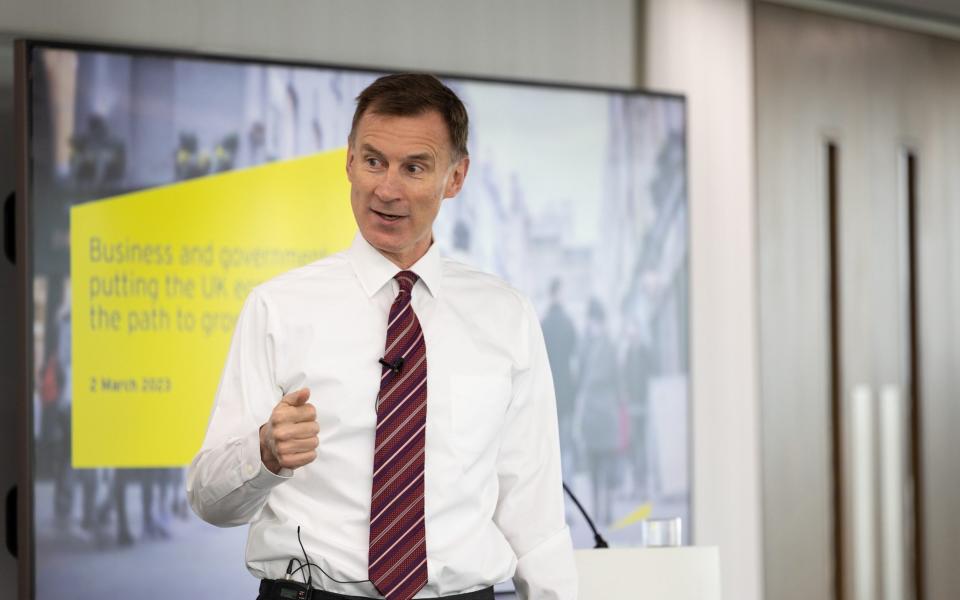
10:04 AM
Oil workers to go on strike
Nearly 50 offshore workers on several of BP’s North Sea installations have backed strike action in pursuit of a pay increase and overtime changes, union Unite has said.
The strike involves crew working on BP’s Andrew, Clair, Clair Ridge, ETAP, Glen Lyon and Mungo installations in the North Sea, with “a series of 24 and 48-hour stoppages”.
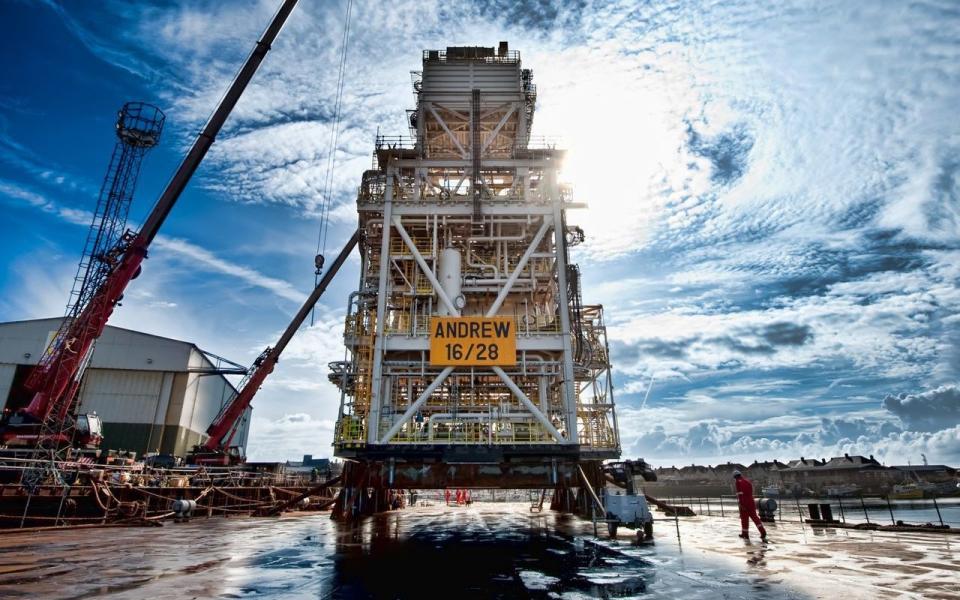
09:45 AM
UK business activity expands for first time since August
Business activity rebounded last month to its strongest level since June last year amid falling gas prices, according to a closely watched index.
Output from the UK service sector expanded for the first time in six months in February amid a turnaround in client confidence, according to the S&P Global and CIPS UK Services purchasing managers’ index.
It gave a reading of 53.5 for February, up from 48.7 in January. A figure above 50 indicates expansion and below shows contraction.
Businesses were helped by the decline in wholesale gas prices, which left input inflation at its lowest level in 20 months.
Rising export sales contributed to the rebound in total new orders in February, reaching its strongest level since May 2022.
09:43 AM
‘Better than 50pc chance’ annual energy bills to stay at £2,500, says Lewis
There is a “better than 50pc chance” that energy bills will stay at £2,500 instead of rising to £3,000 a year from April, consumer champion Martin Lewis has said, amid speculation that Government support will be maintained.
He told BBC Radio 4’s Today programme: “I was saying earlier in the week, reading the runes, it was a better than 50% chance that the price wouldn’t go up.”
He said some energy firms are planning to keep April’s rates at current levels, suggesting energy help will continue. He added:
I’m hearing they have not been told that the rate is staying.
They have been told that there is an attempt to keep the rate at £2,500.
So we’re not at the smoking gun stage that this is definitely happening, but I would say we’re at an 85pc likelihood that the price won’t be going up.
If there’s no U-turn, you’ll pay 20pc more than you do now. If there is a U-turn, you’ll pay exactly the same as you do now.
09:34 AM
Maintaining energy price guarantee at £2,500 is ‘cheap’
On the face of it, it looks like a no brainer for Jeremy Hunt to keeping the energy price guarantee (EPG) at £2,500 for an extra three months.
Economics editor Szu Ping Chan explains why:
Keeping the EPG at £2,500 past April 1 will provide households across the UK with some much-needed relief.
It would also help to bear down on inflation and reduce the headline rate more quickly. After all, prime minister Rishi Sunak has vowed to halve it this year.
What’s more, it’s cheap. Relatively anyway. Falling energy costs means the Chancellor is expected to spend just £1.9bn capping typical bills this year, rather than the £12.8bn estimated at the time of the Autumn Statement, according to the Institute for Fiscal Studies (IFS).
Not letting the cap rise to £3,000 will raise the total cost of the EPG to £4.6bn this year – still representing a saving compared with November.
So why is the Treasury still toying with the policy? Put simply, it’s because keeping bills down now could stoke inflation later.
Catherine Mann, a member of the Monetary Policy Committee that sets interest rates, warned just this week that a fall in energy costs might prompt consumers to spend more on other things, potentially pushing up inflation in other parts of the economy.
09:16 AM
Billionaire investor sends troubled Adani’s shares soaring
One of the biggest names in investing in emerging-markets is betting $1.9bn (£1.6bn) on Gautam Adani’s struggling empire.
Rajiv Jain’s GQG Partners bought shares in four firms from an Adani family trust at discounts to Thursday’s closing prices.
Ot is the most significant show of support from a major money manager since a short-seller report wiped $153bn (£127.6bn) off the Indian conglomerate’s market value.
All 10 Adani Group stocks climbed in Mumbai on Friday, with their combined market value rising by about $8bn (£6.7bn).
That is set to be the biggest increase since short-seller Hindenburg Research’s January 24 report which made accusations of accounting fraud and share-price manipulation.
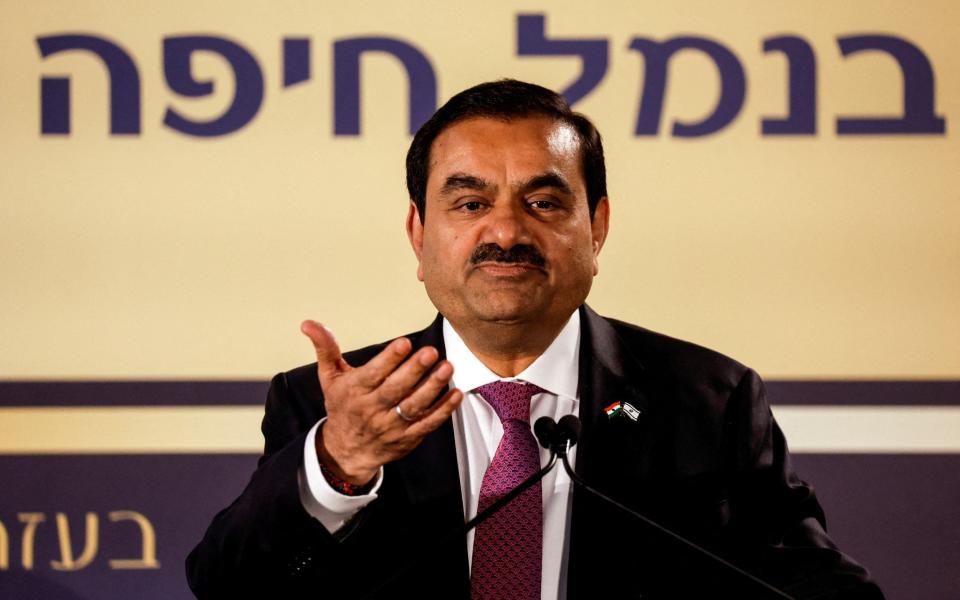
09:05 AM
BP opens its largest EV charging hub in the UK
BP has opened its fastest, most powerful and largest electric-vehicle charging hub in Kettering, Northamptonshire.
Drivers using the site at the intersection of the A14 and A43 will be able to use one of ten 300kW chargers, capable of adding up to 100 miles of charge in around 15 minutes.
BP’s electric vehicle charging business bp pulse has already built hubs in Park Lane, London, and at Gatwick Airport.
A site is under construction in the West Midlands, which when completed will contain 16 ultra-fast 300kW chargers capable of charging 32 EVs at any one time.
It comes after BP last month dialled back on targets to cut oil and gas production by 40pc by 2030, saying it will now only cut by 25pc.
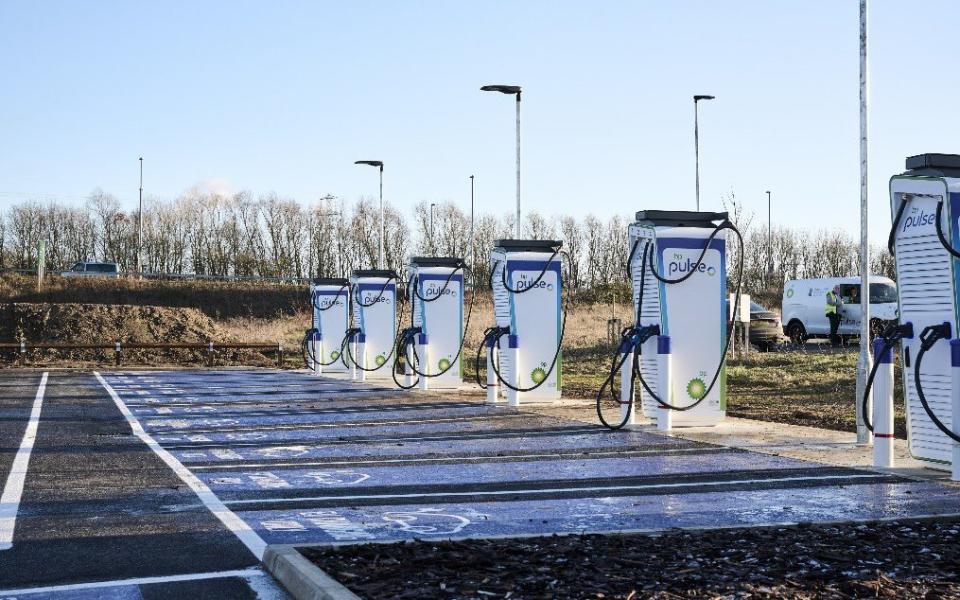
08:45 AM
Mining stocks boost FTSE 100
The FTSE 100 opened higher, boosted by mining stocks as metal prices rose on optimism of a recovery in top consumer China, while an overnight rise in US stocks also helped gains.
The blue-chip FTSE 100 gained 0.3pc, while the more domestically-focussed FTSE 250 midcap index rose 0.3pc.
Both British indexes are on track to rise nearly 1pc for the week.
Industrial metal miners took an early lead, rising 1.6pc as metal prices gained after promising economic data from China buoyed demand prospects.
Global markets are tracking overnight gains in US markets, which closed higher on Thursday, taking cues from Atlanta Federal Reserve President Raphael Bostic who argued for the central bank to stick with “steady” quarter-point rate increases for now.
Oilfield services firm Hunting dropped 10.6pc after Berenberg downgraded the stock to “hold” from “buy”.
08:36 AM
Hotel Chocolat ‘begins redundancy process’
Hotel Chocolat has begun a formal redundancy process as it reportedly seeks to take the business in a “leaner and more competitive direction”.
Staff were notified that their roles were at risk on February 21 as the UK chocolate business said it was “operating with a backdrop of calmer growth plans and increasing costs”, according to a letter seen by Grocery Gazette. It said:
In line with the shape of our future plan we’ve taken steps to build more collaboration, cost-efficiency and profitability into our model.
The next major step on this journey is organising ourselves for sustainable success in 2023 and beyond.
The decision to impact colleagues is not taken lightly. This means we need to make some changes to the way we organise that may involve fewer members of the team.
Our business plan has evolved to focus on more careful growth, and we will now work through a formal consultation process.
A Hotel Chocolat spokesman said: “We recognise this is a difficult time for our team as we consult with them on the proposal, and we are supporting them at this time.
“This decision has not been taken lightly. After careful consideration, the changes we are proposing are part of the next phase in our journey towards sustainable success for the years ahead.”
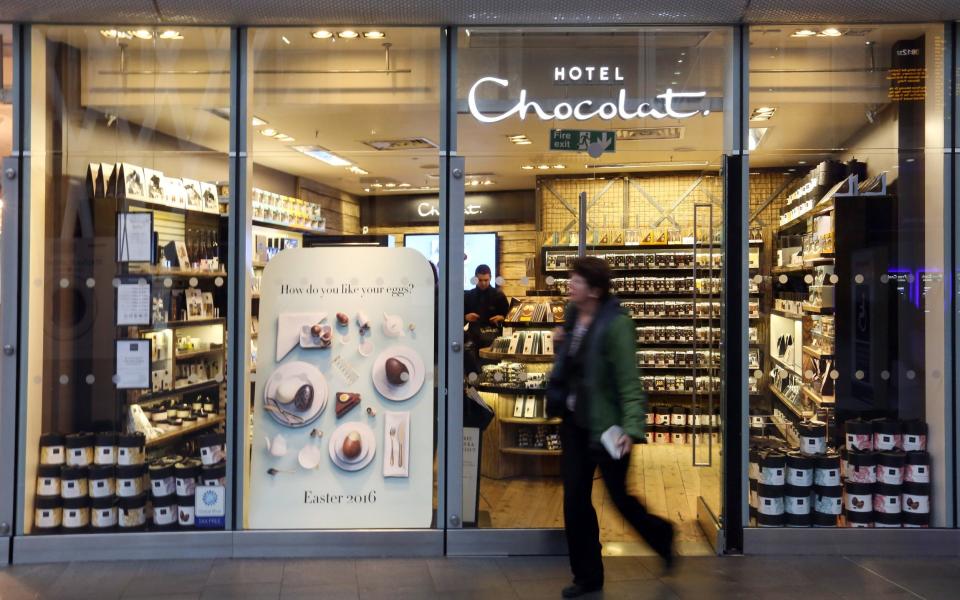
08:26 AM
Pearson predicts fall in higher education income
Education group Pearson has seen its share price fall after it warned of a decline in higher education revenues and predicted underlying sales growth of low to mid single digits.
The company was boosted last year by virtual learning and the resumption of exams in the UK as profits grew by nearly a fifth.
It said demand for English language learning grew 24pc, as overall sales increased 12pc to £3.8bn while its adjusted operating profit was up 18pc to £456m.
However, a fall in higher education by 4pc was driven by a decline in enrolments and a loss of adoptions to non-mainstream publishers, including open educational resources.
Chief executive Andy Bird said: “These results are testament to the strong momentum that we’ve been building operationally and strategically over the past 24 months.
“For a second consecutive year, our financial performance was ahead of expectations, and we saw progress in our strategic initiatives, which are taking Pearson on a new, exciting journey.”
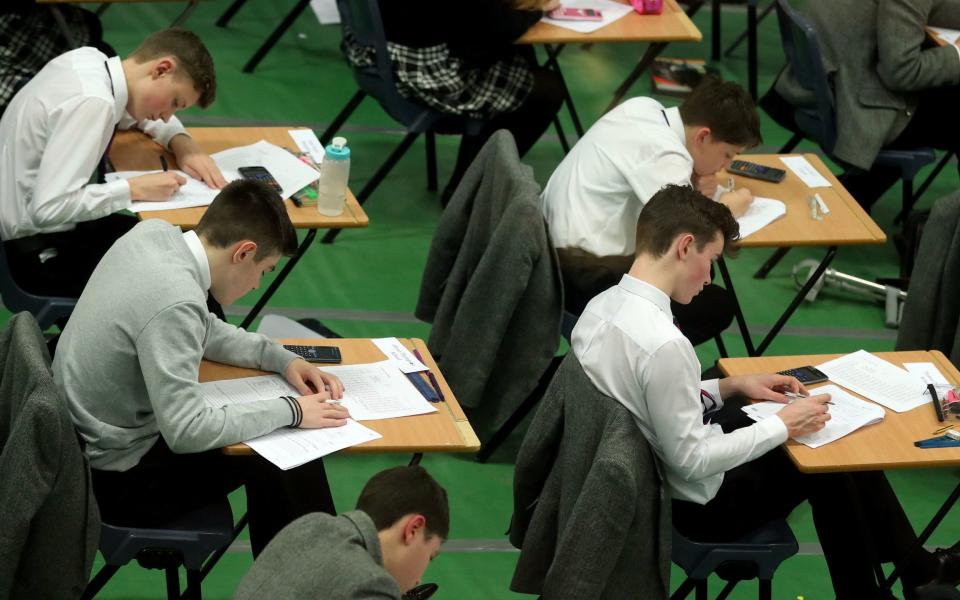
08:03 AM
Markets rise at the open
The FTSE 100 has rallied after steadier comments from a US Federal Reserve chief about the outlook for interest rates.
The blue chip index was up 0.5pc to 7,955.97 while the midcap FTSE 250 rose 0.2pc to 19,899.17 at the open.
Atlanta Federal Reserve President Raphael Bostic said he favoured “slow and steady” quarter-point US rate increases to limit risk to the economy.
08:00 AM
Cutting oil and gas production ‘is not healthy’, says Shell boss
Shell’s new boss has said cutting oil and gas ouput will be bad for customers, echoing comments from the chief executive of rival producer BP.
Wael Sawan told Time Radio:
I am of a firm view that the world will need oil and gas for a long time to come.
As such, cutting oil and gas production is not healthy.
We’ve seen of course through 2022 the fragility of the energy system.
To see prices start to skyrocket, that’s not healthy for anyone, particularly consumers.
This week, BP chief executive Bernard Looney warned that dutting fossil fuel supplies too quickly risks a fresh surge in energy prices.
07:53 AM
Government defends London stock market after Arm confirms $70bn snub
The British microchip company Arm has confirmed it has rejected ministers’ lobbying and will proceed with a bumper US stock market listing.
Technology editor James Titcomb has the latest:
Rene Haas, Arm’s chief executive, said the decision to float its shares on Wall Street came despite talks with the Government and Financial Conduct Authority (FCA).
He confirmed that Arm planned a secondary UK listing at some point in the future and said that the company would continue to be headquartered in Britain.
Confirmation that Arm will snub London is a blow to the Government, which had lobbied for Arm to return to the British stock market, and adds to growing concerns about the competitiveness of the market.
Read what Mr Haas and a Government spokesman said.
07:42 AM
FCA launches investigation into handling of nickel short squeeze
The markets watchdog has opened an investigation into the London Metal Exchange’s handling of a controversial short squeeze in the nickel market last year.
The Financial Conduct Authority said it opened an enforcement investigation into some of the LME’s “conduct and systems and controls” in the period leading up to the suspension of trades.
The LME cancelled about $3.9bn worth of trades on March 8 when futures spiked 250pc in a little over 24 hours.
The LME’s actions effectively served as a bailout of top nickel producer Tsingshan Holding Group and eased the strain on brokers who were facing huge margin calls.
But it also caused huge controversy after hedge funds and other traders had highly profitable contracts torn up.
The Bank of England, which separately reviewed the LME’s clearing operation, said that the clearing unit will need to strengthen its governance arrangements, increase independence in management and governance.
The LME said it will cooperate with the FCA’s investigation.

07:37 AM
Rightmove shrugs off mini-Budget mortgage turbulence
Rightmove chief executive Peter Brooks-Johnson will step down after 17 years in the business in 2023, including six years as its boss.
He hailed the company’s business model as it navigated the rapid rise in mortgage rates following the mini-Budget, as average revenue per advertiser grew by £125 – its second-highest performance after the 2021 Covid-recovery year. He said:
The year’s changing housing market conditions demonstrated our customers’ resilience and ability to adapt and to continue to succeed.
The softening from the Covid-induced frenetic market towards a more normal market earlier in the year was disrupted in the final few months by the unexpected rapid mortgage rate increases.
The strength of our results is a reminder of how effective and integral our new and existing products and services are in helping our customers in both faster and slower markets.
07:30 AM
Developers turn to Rightmove as off-plan sales dry up
Developers usually selling homes off plan turned to Rightmove to boost sales at the end of last year, as the estate agent revealed rising profits.
The online agent said it enjoyed an 8pc increase in the number of developments listed on its website at the end of 2022.
Rightmove brushed off concerns about the outlook for the property market as it revealed operating profit grew 7pc last year to £241.3m. Revenues were up 9pc to £332.6m.
In its annual results, the company said it will “remain alert to the ongoing economic uncertainty” but insisted it is “not materially impacted by the property market cycle”.
It will increase its final dividend for 2022 by 8pc to 5.2p.

07:11 AM
HS2 boss says delays under consideration as inflation bites
The HS2 rail project could be delayed among a number of potential options being considered to curb rising costs, the project’s boss has said.
In an interview with the BBC, HS2 chief executive Mark Thurston said the impact of inflation on the project over the past year has been “significant… whether that’s in timber, steel, aggregates for all the concrete we need to use to build the job, labour, all our energy costs, fuel”.
Phase One of HS2 involves the railway being built between London and Birmingham, with the line extended from the West Midlands to Crewe in Phase 2a.
Phase 2b will connect Crewe to Manchester, and the West Midlands to the East Midlands.
The latest target cost of Phase One between London and Birmingham is £40.3bn at 2019 prices.
A budget of £55.7bn for the whole of HS2 was set in 2015.
Mr Thurston told the broadcaster HS2 was in discussion with suppliers and the Government on finding ways to minimise the soaring costs.
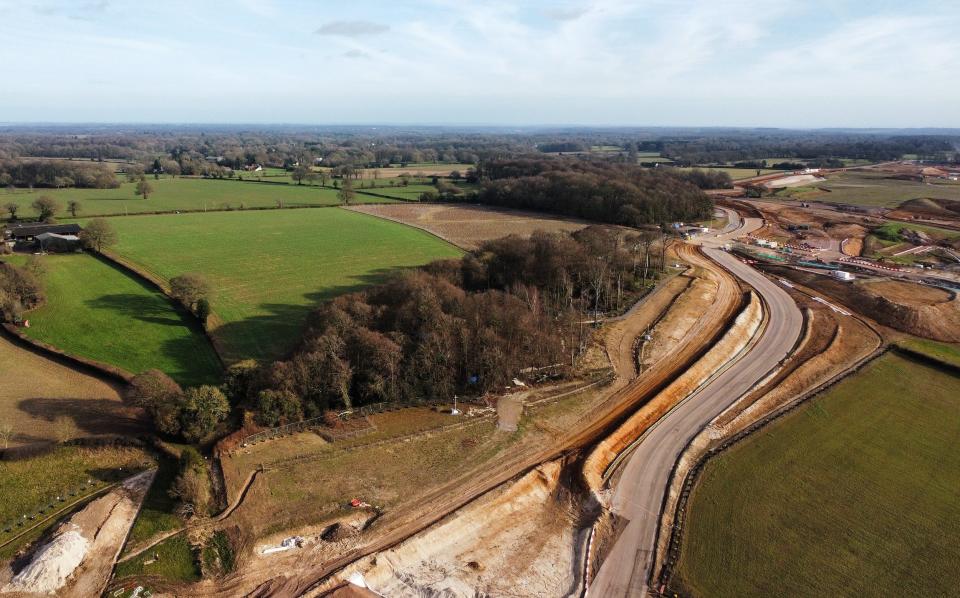
07:06 AM
Good morning
Energy companies expect Jeremy Hunt to maintain his energy price guarantee at or close to £2,500 from April 1, sources have indicated to the BBC.
Some suppliers have started to amend future bills to reflect the possibility that Government subsidies will not change as expected.
Households are due to see bills rise by £500 from April 1 when the energy price guarantee increases the maximum average energy bill annually to £3,000.
5 things to start your day
1) London has given up on risk and cannot compete with New York, warns City chief | Britain’s failure to back “risk takers” means London is unable to compete with New York
2) Abandon hedonistic Western lifestyles, Chinese bankers told | Anti-corruption watchdog escalates crackdown on ‘unhealthy’ tendencies
3) Heat pumps and EV batteries could save grid £4.7bn, says Ofgem | Regulator’s proposals aim to counter the problems renewable energy poses to the grid
4) Train services worst on record as 1,000 a day cancelled | Reliability plummets even on non-strike days, figures reveal
5) Immigration loophole will not be closed until autumn in move to avoid summer holiday chaos | Government delays ban on airlines’ ‘wet leasing’ to relieve staff shortage pressures
What happened overnight
Asian shares rose on prospects for a steady economic recovery in China and after Wall Street reversed losses overnight following remarks by the Atlanta Federal Reserve chief on interest rates.
Investors breathed a sigh of relief after Raphael Bostic said he favoured “slow and steady” quarter-point US rate increases to limit risk to the economy.
MSCI’s broadest index of Asia-Pacific shares outside Japan was up 0.7pc, on track for its first weekly rise in five. The index is up 1.6pc so far this month.
Japan’s stocks ended higher, with the benchmark Nikkei 225 index advancing 1.6pc to 27,927.47, while the broader Topix index added 1.3pc to 2,019.52.
Australian shares were up 0.4pc, helped by gains in miners and financials, while China’s blue-chip CSI300 index was up 0.2pc in afternoon trade while the Shanghai Composite Index gained 0.4pc. Hong Kong’s Hang Seng index advanced 0.9pc.
Stocks on Wall Street flipped losses to gains on Thursday, as Treasury yields retreated from earlier highs.
The Dow Jones Industrial Average ended trading up 1pc at 33,003.57. The S&P 500 closed 0.8pc higher at 3,981.35, while the tech-rich Nasdaq composite gained rose 0.7pc to 11,462.98.
Treasuries marched higher before pulling back following dovish reports that the Federal Reserve could pause interest rate hikes this summer.
Still, the yield on 10-year Treasury notes – the benchmark for global borrowing costs – reached a four-month high of 4.091pc. Meanwhile, the yield on two-year Treasury notes, which closely tracks short-term interest rate expectations, advanced to a 16 year high of 4.889pc.
Share this news on your Fb,Twitter and Whatsapp
Times News Network:Latest News Headlines
Times News Network||Health||